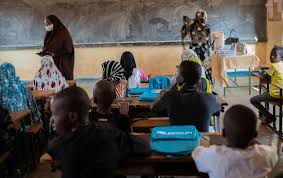| In Niger, the Ministry of Education has validated the six-month Accelerated Education Programme (AEP) developed by the Norwegian Refugee Council (NRC).
A major step forward was taken on Tuesday, 17 September 2024, with the AEP validation workshop attended by representatives of the Ministry of National Education, technical and financial partners in the education sector, regional and communal education officials, AEP designers, NRC and partner INGOs. After very fruitful discussions, which highlighted the quality and relevance of the programme and its alignment with the renewed national programme currently underway, the Ministry validated the six-month AEP with its extension to emergency zones. The aim of the programme is to prepare out-of-school refugee, displaced and host community children aged 6 to 7/8 for entry into primary school. At the end of these six months of condensed classes, these children will be able to join the second year of primary school, the cours préparatoire. “The AEP was submitted to the technicians for comment. It meets the technical requirements and is adapted to the renovated programme. It’s a programme that will guarantee educational continuity in emergency zones,” assures Salley Djafarou, Director General of Education and Training. Initially, the programme lasted three months and was developed to promote access to the first year of primary school for out-of-school refugee children aged 6 to 8, as well as children from displaced and local communities in the Maradi region. It was validated in 2020, implemented first in Maradi, then extended to Tillabéri in 2021 and Tahoua in 2023, in response to the growing need for access to primary education. Now lasting six months, the AEP enables children to enter the second year of primary school, the cours préparatoire, directly. This programme fills a gap in educational provision for out-of-school children aged 6 to 8, an age group not covered by the national Strategy of Accelerated School (Stratégie de Scolarisation Accélérée/Passerelle), which is aimed at out-of-school or early drop-out children aged 9 to 12. Evaluations have shown positive impacts in terms of learning, school awareness, confidence-building, and feelings of security and safety at school. Reinforced by the Better Learning Programme (BLP), this programme includes a psychosocial support component for child victims or witnesses of violence, who arrive at school in a traumatised state, hindering their ability to learn. As part of the BLP, teachers receive pedagogical training adapted to the needs of these children. “The AEP is a solution that facilitates access to school. It enables the child to gain one school year in six months. What’s more, the child benefits from substantial psychosocial support through the BLP. This programme helps keep children off the streets. It also brings a new experience to the teachers, who see their skills reinforced,” emphasises Idrissa Maïga, Regional Inspector of Primary Education. According to the report distributed by the APO Group on behalf of Norwegian Refugee Council, the six-month accelerated education programme reinforces NRC’s position in Niger’s educational response and guarantees educational continuity in emergency zones. GIK/APA |


